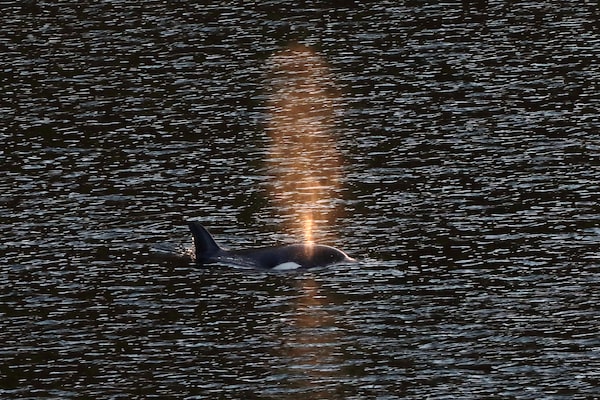
A two-year-old female orca calf swims in Little Espinosa Inlet near Zeballos, B.C. on, April 19.Chad Hipolito/The Associated Press
Finally, on Friday, a little cheer and a huge sigh of relief. The Brave Little Hunter, or kwiisahi?is (her Nuu-chah-nulth name, pronounced Kwee-sa-hay-is), had swum free.
For weeks, Canadians had followed the orphaned orca calf’s plight. After her pregnant mother Spong was beached and died on a sandbar in March, T109A3A (the calf’s tag from whale experts) swam through the shallow water into a remote Vancouver Island lagoon and wouldn’t leave.
Local First Nations and other experts, desperate to reunite kwiisahi?is with her pod, tried to lure her out to the open water, but without success. Would-be rescuers played recordings of the calf’s family members and offered sea lion meat to entice her to leave.
Deeply interested in this story, I found it almost painful to read anything about it. Was this orphaned child waiting for her mama? Or mourning her? Were her natural instincts overwhelmed by grief?
Then, early Friday, news from the Ehattesaht First Nation: “At 2:30 a.m. during the high tide on a clear and glass-calm, star-filled night, Kwee-sa-hay-is swam past the sandbar her mother passed away on ... all on her own,” Chief Simon John wrote in a statement.
There is no shortage of terrible news, no paucity of heinous human death tolls. Still, an animal tragedy can trigger a particular kind of emotional intensity.
“When we are presented with animals who we are not encultured to see as lesser or to eat, but are rather culturally revered as companions (dogs and cats) or megafauna (whales and dolphins), then the empathy we have can express itself, especially when it is a baby animal separated from her mother,” the University of Victoria’s Animals & Society Research Initiative director Maneesha Deckha told me in an e-mail from Switzerland, where she is a visiting professor at the University of Zurich’s Centre for Animal Law and Ethics.
“We can understand that animals have families, and mothers often care deeply for their children in non-human worlds too,” she added.
There’s something I’ve noticed in news broadcasts. When a tragedy involves an animal, the news reader sometimes adds an adverb to the story: “Unfortunately.” When do you hear that word used in a report about a human death? Or thousands of them? Even the hardened heart of a journalist, it seems, can be twisted up by stories about animals in trouble.
Like Karen, the five-year-old “vibrant and beloved” ostrich at Kansas’s Topeka Zoo and Conservation Center who was known for her playful antics. As the zoo shared recently, a final antic would prove fatal. Karen reached outside the fence of her exhibit, grabbed a staff member’s keys and swallowed them immediately.
Zoo staff consulted with experts around the country for ways to treat her, but “unfortunately,” as the zoo said, all efforts were unsuccessful. Karen was euthanized.
Why, on reading this, was I almost in tears? I have never been to this zoo, or even heard of it. I like birds as much as the next person, but would hardly call myself an avian (or ostrich) enthusiast. Yet Karen with the keys was almost too much to take.
There is a growing subfield of psychological studies on human-animal relations, Dr. Deckha told me.
We are beginning to recognize, sometimes officially, the value of animals in our lives. British Columbia recently introduced changes to family law that recognize pets not as property, but as sentient beings worthy of custodial arrangements. “Any time we see animals as more than property, it’s a win for society,” Victoria Shroff, adjunct professor of animal law at the University of British Columbia, told The Globe and Mail in January when the changes took effect.
The answer to why stories about animals affect us so deeply may be as simple as the uncomplicated love we receive from them. The loss of a pet is often a child’s first experience with death and grief.
Anyone who has or has had a pet knows: animals are family. I hope more workplaces begin to recognize this by offering some bereavement leave when a pet dies.
Beyond the domestic, we see what we are doing to the animals that have gone about their lives roaming the Earth for eons before we came along and messed it up. Now they’re clinging to shrinking ice floes, ingesting plastic, dying in wars. They have done nothing to us. And look what we are doing to them.
From Brave Little Hunter, to Karen, to fictional heart-tuggers like Old Yeller, animals can be potent reminders of our humanity. There are no politics involved, no sides to take. There shouldn’t be, anyway. This is the kind of tragedy – or triumph – that can unite us.
 Marsha Lederman
Marsha Lederman